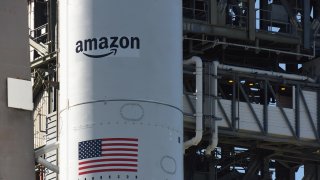- Elon Musk’s SpaceX is helping Amazon launch more of its Kuiper internet satellites into orbit.
- A Falcon 9 rocket carrying 24 Kuiper satellites is slated to take off on Wednesday.
- Amazon is racing to catch up to SpaceX’s Starlink, which currently dominates the market with a constellation of roughly 8,000 satellites.
As
Amazon
chases SpaceX in the internet satellite market, the e-commerce and computing giant is now counting on
Elon Musk’s
rival company to get its next batch of devices into space.
Stream San Diego News for free, 24/7, wherever you are with NBC 7.
On Wednesday, weather permitting, 24 Kuiper satellites will hitch a ride on one of SpaceX’s Falcon 9 rockets from a launchpad on Florida’s Space Coast. A 27-minute launch window for the mission, dubbed “KF-01,” opens at 2:18 a.m. ET.
The launch will be
livestreamed
on X, the social media platform also owned by Musk.
Get top local San Diego stories delivered to you every morning with our News Headlines newsletter.
The mission marks an unusual alliance. SpaceX’s Starlink is currently the dominant provider of low earth orbit satellite internet, with a constellation of roughly 8,000 satellites and about 5 million customers worldwide.
Amazon launched Project Kuiper
in 2019
with an aim to provide broadband internet from a constellation of more than 3,000 satellites. The company is working under a tight deadline imposed by the Federal Communications Commission that requires it to have about 1,600 satellites in orbit by the end of July 2026.
Amazon’s first two Kuiper launches came in
April
and
June
, sending 27 satellites each time aboard rockets supplied by United Launch Alliance.
Money Report
Stock futures slip as investors await more bank earnings and inflation data: Live updates
Westinghouse plans to build 10 large nuclear reactors in U.S., interim CEO tells Trump
Assuming Wednesday’s launch is a success, Amazon will have a total of 78 satellites in orbit. In order to meet the FCC’s tight deadline, Amazon needs to rapidly manufacture and deploy satellites, securing a hefty amount of capacity from rocket providers. Kuiper has booked up to 83 launches, including three rides with SpaceX.
Space has emerged as a battleground between Musk and Amazon founder
Jeff Bezos
, two of the world’s richest men. Aside from Kuiper, Bezos also competes with Musk via his rocket company Blue Origin.
Blue Origin in January sent up its massive New Glenn rocket for the first time, which is intended to rival SpaceX’s reusable Falcon 9 rockets. While Blue Origin currently trails SpaceX, Bezos
last year predicted
his latest venture will one day be bigger than Amazon, which he started in 1994.
Kuiper has become one of Amazon’s biggest bets, with more than $10 billion earmarked for the project. The company may need to spend as much as $23 billion to build its full constellation, analysts at Bank of America wrote in a note to clients last week. That figure doesn’t include the cost of building terminals, which consumers will use to connect to the service.
The analysts estimate Amazon is spending $150 million per launch this year, while satellite production costs are projected to total $1.1 billion by the fourth quarter.
Amazon is going after a market that’s expected to grow to at least $40 billion by 2030, the analysts wrote, citing estimates by
Boston Consulting Group
. The firm estimated that Amazon could generate $7.1 billion in sales from Kuiper by 2032 if it claims 30% of the market.
“With Starlink’s solid early growth, our estimates could be conservative,” the analysts wrote.
WATCH:
Amazon launches first Kuiper internet satellites into space
Also on CNBC
-
Bitcoin falls below $117,000 after Trump crypto bills are blocked before vote
-
Circle stock drops after House blocks key procedural vote on stablecoin legislation
-
Joby Aviation says it is doubling production at its air taxi manufacturing hub







